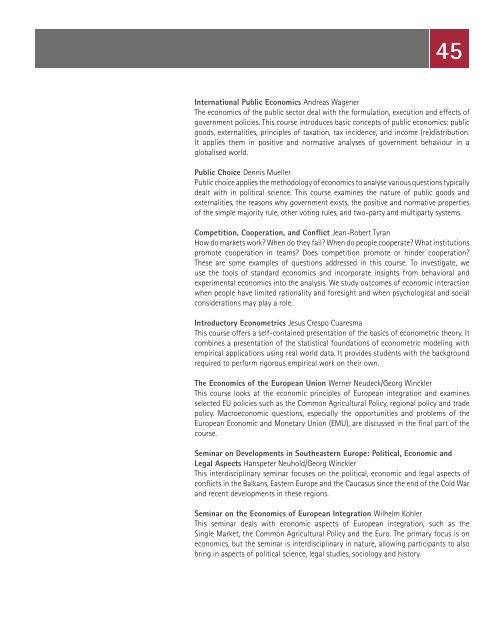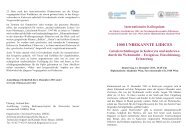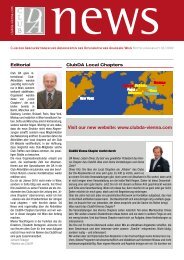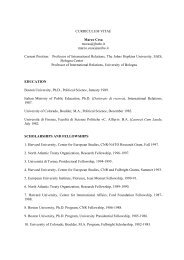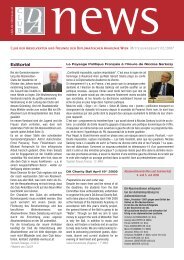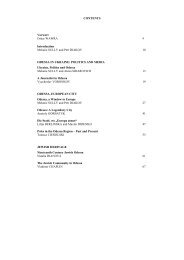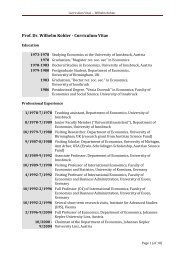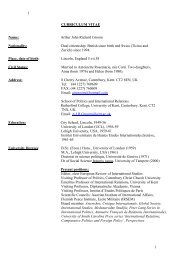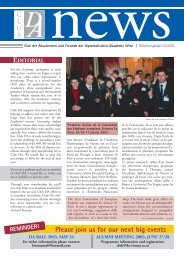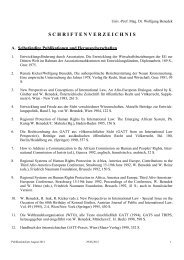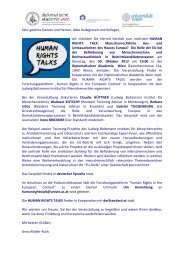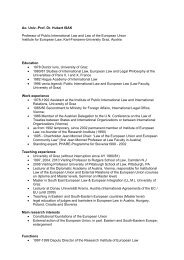Brochure - Diplomatic Academy Vienna
Brochure - Diplomatic Academy Vienna
Brochure - Diplomatic Academy Vienna
You also want an ePaper? Increase the reach of your titles
YUMPU automatically turns print PDFs into web optimized ePapers that Google loves.
45<br />
International Public Economics Andreas Wagener<br />
The economics of the public sector deal with the formulation, execution and effects of<br />
government policies. This course introduces basic concepts of public economics: public<br />
goods, externalities, principles of taxation, tax incidence, and income (re)distribution.<br />
It applies them in positive and normative analyses of government behaviour in a<br />
globalised world.<br />
Public Choice Dennis Mueller<br />
Public choice applies the methodology of economics to analyse various questions typically<br />
dealt with in political science. This course examines the nature of public goods and<br />
externalities, the reasons why government exists, the positive and normative properties<br />
of the simple majority rule, other voting rules, and two-party and multiparty systems.<br />
Competition, Cooperation, and Conflict Jean-Robert Tyran<br />
How do markets work? When do they fail? When do people cooperate? What institutions<br />
promote cooperation in teams? Does competition promote or hinder cooperation?<br />
These are some examples of questions addressed in this course. To investigate, we<br />
use the tools of standard economics and incorporate insights from behavioral and<br />
experimental economics into the analysis. We study outcomes of economic interaction<br />
when people have limited rationality and foresight and when psychological and social<br />
considerations may play a role.<br />
Introductory Econometrics Jesus Crespo Cuaresma<br />
This course offers a self-contained presentation of the basics of econometric theory. It<br />
combines a presentation of the statistical foundations of econometric modeling with<br />
empirical applications using real world data. It provides students with the background<br />
required to perform rigorous empirical work on their own.<br />
The Economics of the European Union Werner Neudeck/Georg Winckler<br />
This course looks at the economic principles of European integration and examines<br />
selected EU policies such as the Common Agricultural Policy, regional policy and trade<br />
policy. Macroeconomic questions, especially the opportunities and problems of the<br />
European Economic and Monetary Union (EMU), are discussed in the final part of the<br />
course.<br />
Seminar on Developments in Southeastern Europe: Political, Economic and<br />
Legal Aspects Hanspeter Neuhold/Georg Winckler<br />
This interdisciplinary seminar focuses on the political, economic and legal aspects of<br />
conflicts in the Balkans, Eastern Europe and the Caucasus since the end of the Cold War<br />
and recent developments in these regions.<br />
Seminar on the Economics of European Integration Wilhelm Kohler<br />
This seminar deals with economic aspects of European integration, such as the<br />
Single Market, the Common Agricultural Policy and the Euro. The primary focus is on<br />
economics, but the seminar is interdisciplinary in nature, allowing participants to also<br />
bring in aspects of political science, legal studies, sociology and history.


